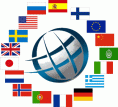 The mechanisms for naming systems connected to the Internet make up the very foundation on which the rest of the Internet is built — whoever controls this capability controls the Internet.
The mechanisms for naming systems connected to the Internet make up the very foundation on which the rest of the Internet is built — whoever controls this capability controls the Internet.
Yesterday NTIA announced their intent to transfer control of Internet naming functions to the “global multistakeholder community” and tasked ICANN with defining what this should look like. This historic decision sets the Internet on a path towards freedom from any single nation’s agenda, and most importantly lays the ground work necessary to start rebuilding global trust and privacy.
Up until now governance of Internet naming has been the responsibility of IANA for the NTIA in the US Department of Commerce. IANA in turn contracts this responsibility out to the Californian not for profit corporation ICANN who has run things since 1998. ICANN has done a pretty good job in keeping things running despite numerous challenges ranging from targeted hacks through to giant distributed denial of service attacks. However the fact that the US remains in control — and most significantly the only country with a say in how this works — has been a hotly debated topic for decades.
For all sorts of good reasons many believe that the Internet should be managed by a global organization into which all nations have equal input. Not least of which is the fact that the internet is a global asset which brings huge benefit to all the peoples of the world. However, despite this argument, for as long as the subject has been debated the US has always insisted that it will “maintain its historic role”. In 2006 though, the US Government finally relaxed its position, recognizing that if it wanted to keep the Internet intact it would need to transition its role. That it would need to open governance of the Internet up to the rest of the world. It was this decision that set the scene for yesterday’s historic announcement.
As well as protecting the Internet from the influence of any one nation’s agenda, global cooperation will empower the new overseeing organization to move the Internet forwards. Only with global buy-in is it going to be possible to start dealing with some of the more challenging problems that the internet is already facing — such as how to ensure the whole world benefits from the Internet, and not just the wealthiest nations. It even opens up the possibility that this body could start looking at how to tackle rising Internet crime — something which respects no borders and hurts every nation.
What this new system of governance will will look like is not defined yet and indeed there are still many pitfalls to be avoided – For example a system of rotating control is unlikely to work as whichever nation assumes control could abuse its tenure to push their agenda by hijacking sites or wiping others off the internet. Doing this right is possibly going to be one of the most challenging problems the internet has faced since it’s birth. However I for one am hopeful that this is a first, promising step in the right direction.
